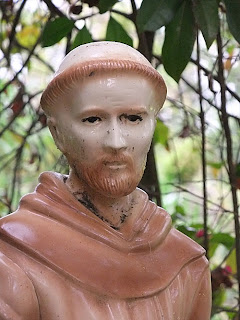Make straight the way (Magnificat series)
52 He has brought down the powerful from their thrones,
and lifted up the lowly;
53 he has filled the hungry with good things,
and sent the rich away empty.
Last week, I wrote about verse 51, which talked about what God does to pride.
What happens when the core, most central, sin of pride is no more?
The powerful are brought down from their thrones. There is no need for thrones when all are humble and look to God. Do you remember Samuel protesting to God about Saul being made King? (1 Samuel 8 to refresh your memory.)
The lowly are lifted up: without pride, without sin, the playing field is level. There's no superiority in this world.
The hungry are filled with good things: pride is no more, pride that can make us do selfish things, like hoard resources, like grain.
The rich are sent away empty: everyone has enough. Not stuff for the sake of owning stuff, or nicer stuff, or more pretty-shiney stuff than one's neighbor. All are satisfied, because that pesky sin pride is out on its arse. Sorry, I mean, no longer has a place in our hearts.
Can you imagine a world like that? Not ruled but all accomplished from the freedom of the heart, for our hearts will have been freed from pride by God.
Rachel Held Evans's post last week (if you haven't read it already), pointed the way to how this is/shall be achieved. Via the Messiah, through Jesus who showed in his actions how to live a Kingdom Now (or Jubilee) life.
On the very same day, I saw a webinar given by Micah Goodman. (This is because I work at an incredibly cool place that lets me geek out on theology now and then.) It's called "The Memory of Miracles" and it blew me away in several different ways, and not the least because it was a confluence of my study, writing, and reading Rachel's blog the same day.
It's worth listening to the whole thing (with printout in hand because he reads the scripture passages in Hebrew).
He talks about how there are two ways of dealing with miracles: one is passive and relies on God to take care of everything.
The other way is that of Moses (Moshe in the talks). In Exodus, Moses hands down the 10 commandments and the other laws from God to the Israelites. In Deuteronomy, it is Moses telling the story of Exodus, including the commandments and he adds an interpretation to the law.
The first law after the 10 commandments deals with freeing Hebrew slaves. It's simply stated in Exodus (21:1-2). In Deuteronomy 15:12-15, Moses explains why: just as God liberated we Israelites from slavery in Egypt, so must we also liberate our slaves. We don't let go a slave empty-handed but give them gifts so they can make a life for themselves. Truly free, truly liberated.
As God liberates, so must we. It echoed so strongly what Rachel (and Walter Brueggeman) said about Jesus that I almost fell out of my chair.
God showed Moses that the Israelites should pass on their liberation to others. God, through Jesus, continues Moses' example and shows us how to make the field level for all.
To paraphrase Mary: "Let it be ... according to your word." (Luke 1:38, sorta)



Comments
Post a Comment
Thank you for taking the time to leave a comment.